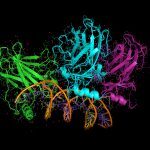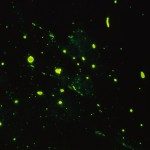Lien vers Pubmed [PMID] – 29084252
Lien DOI – 10.1371/journal.ppat.1006697
PLoS Pathog 2017 Oct; 13(10): e1006697
At the crossroad between the NF-κB and the MAPK pathways, the ternary complex composed of p105, ABIN2 and TPL2 is essential for the host cell response to pathogens. The matrix protein (M) of field isolates of rabies virus was previously shown to disturb the signaling induced by RelAp43, a NF-κB protein close to RelA/p65. Here, we investigated how the M protein disturbs the NF-κB pathway in a RelAp43-dependant manner and the potential involvement of the ternary complex in this mechanism. Using a tandem affinity purification coupled with mass spectrometry approach, we show that RelAp43 interacts with the p105-ABIN2-TPL2 complex and we observe a strong perturbation of this complex in presence of M protein. M protein interaction with RelAp43 is associated with a wide disturbance of NF-κB signaling, involving a modulation of IκBα-, IκBβ-, and IκBε-RelAp43 interaction and a favored interaction of RelAp43 with the non-canonical pathway (RelB and p100/p52). Monitoring the interactions between host and viral proteins using protein-fragment complementation assay and bioluminescent resonance energy transfer, we further show that RelAp43 is associated to the p105-ABIN2-TPL2 complex as RelAp43-p105 interaction stabilizes the formation of a complex with ABIN2 and TPL2. Interestingly, the M protein interacts not only with RelAp43 but also with TPL2 and ABIN2. Upon interaction with this complex, M protein promotes the release of ABIN2, which ultimately favors the production of RelAp43-p50 NF-κB dimers. The use of recombinant rabies viruses further indicates that this mechanism leads to the control of IFNβ, TNF and CXCL2 expression during the infection and a high pathogenicity profile in rabies virus infected mice. All together, our results demonstrate the important role of RelAp43 and M protein in the regulation of NF-κB signaling.







